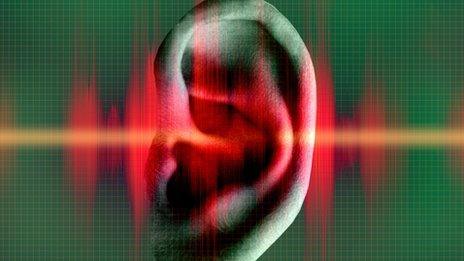'Tinnitus risk' of noisy nights out
- Published

Many over-ride the "safe" levels on their headphones
About two-thirds of people are left with ringing in their ears after a night out at a club, gig or pub, a poll suggests.
Campaign group Action on Hearing Loss said the poll of 1,000 adults also showed a third would ignore the "safe level" on their music players.
The group warns that people doing either increase the risk of tinnitus.
DJ Paul Oakenfold urged people to wear ear defenders to gigs and to "turn down the volume".
Half of those surveyed said they listened to music for between one and six hours a day - up to a third of their waking day - perhaps in the background at work or on their MP3 player on their way to and from work or studies.
But one in five would not do anything differently to take any care of their hearing.
Action on Hearing Loss warned that one in 10 people across the UK is affected by tinnitus every day, ranging from a "light buzzing" to a "constant roar" in the ears and head.
It can affect everything from the ability to concentrate at work to getting to sleep at night.
The poll also found that one in 10 people does not know what tinnitus is, with 3% thinking it was "big ears" and 4% a "repetitive strain injury".
It has created an audio version of what tinnitus sounds like in order to raise awareness.
'Helplessness'
Paul Breckell, chief executive of Action on Hearing Loss, said: "Listening to loud music for a long time can trigger tinnitus and is an indication of damaged hearing.
"Most people have experienced tinnitus, but those who are severely affected can experience fear, anxiety and feelings of helplessness that affect their quality of life.
"Currently there is no cure for tinnitus. As a charity we are doing all we can to fund research into treatments, and in the meantime offer support to people who suffer."
Paul Oakenfold, the DJ and record producer, is supporting the campaign.
He said: "I feel passionately about listening to music safely, and urge music lovers to wear ear defenders to gigs and avoid dangerously high volumes on personal music players.
"Getting decent noise-cancelling headphones also cuts down the risk of damaging your ears and suffering tinnitus caused by overexposure to loud music. No-one wants that."
- Published4 February 2013
- Published24 January 2013
- Published13 June 2011